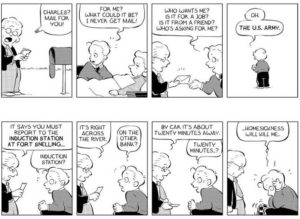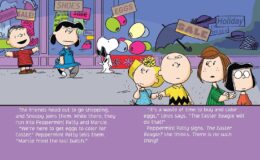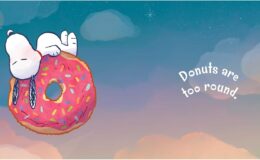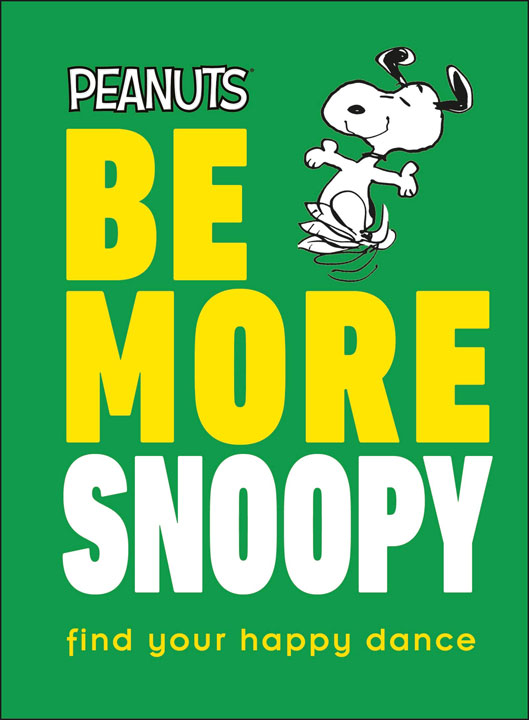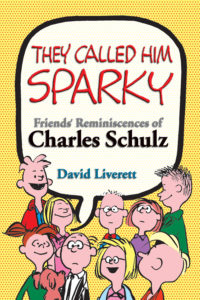Review: Funny Things
- By : Nat
- Category : New releases
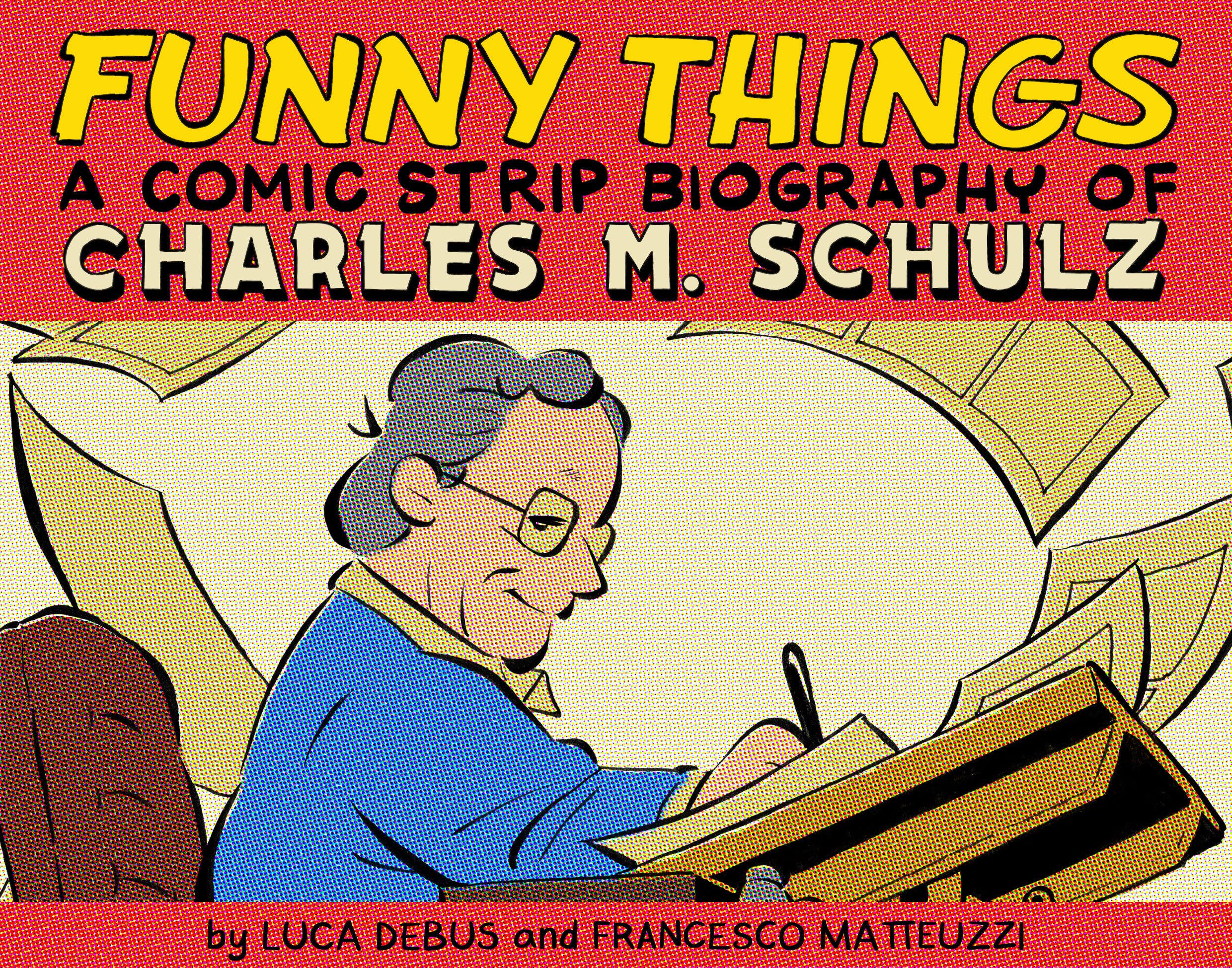
I’m sorry it has taken me so long to review the new Charles Schulz biography Funny Things by Luca Debus and Francesco Matteuzzi, but life is full, and this book is not only long but I think best read not all at once.
But before I get into reviewing it, I suppose I should raise a “conflict of interest” flag. I am, after all, the co-author of a currently-on-the-market biography of Schulz. I am also the current publisher of a biographical book on Schulz
. As such, you might have concerns that I’m reviewing the competition… although I really don’t see it that way. That’s because all of these books are, yes, about the story of Schulz, but moreso they are about how you can tell that story. Each book takes a different method, finds a different answer, and the reading of any of these books I think does more to improve the experience of the others than detract from them.
In this case, the story is told in the comics form. No, wait, that’s not saying enough — there is, for example, the new Bill Griffith biography of Ernie Bushmiller that’s done as a graphic novel, and that is enough of an effort to take. Funny Things tries something even harder, using not just the comics format but the comic strip format. There are probably 800 strips in here, mostly “dailies”, each six of those followed by a “Sunday”, each one made as a sub-unit in itself. Generally, the strips are four panel, with the first three panels being used to display some moment in the life of Schulz, or some attitude he had, and the final panel being a humorous and often non-literal take on it. Stringing so many of these in a row to build a larger picture is like trying to tell an epic as a series of haikus. That is an impressive effort well worth taking on… but the sheer quantity of it also makes reading a bit of an effort, and I think it better read in chunks than in an as-few-sittings-as-possible effort with which one might approach a novel. (Indeed, while presenting the entire work in a single volume reminiscent in format of a Complete Peanuts book makes a lot of sense, part of me wishes this had originally been serialized in 20 comic book issues; it would have fit in with some of what being tried in the late 1980s… although of course that would’ve been too early to tell this life story!)
The strip leans heavily on keeping Schulz the lead character, and doesn’t chase down side alleys of being a history of Peanuts rather than a biography of the man. The art may be intended to invoke Peanuts, but its style reminded me more of Doonesbury… which is fine, as this is more in line with that latter strip’s talking head nature than with the often-kinetic Peanuts. Besides, while Schulz starts as a child, he does have to grow up (and indeed, the last sixth of the book is focused on the final few months of his life.) And when they decide to go fancy and arty with things, the influence feels more like Watterson (who was of course influenced by Schulz himself.)
Would the strips have worked as actual daily strips? Some yes, some are a bit to reliant on being aware of much that had gone before. It would’ve made a strange daily. But that’s not really the intent, the intent is to use the rhythm.
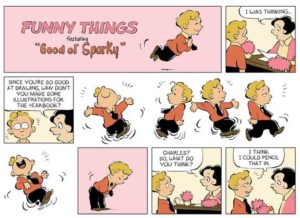 The art (which is by Debus; Matteuzzi is a co-writer rather than an artist) is more inspired by how people actually appeared than attempting to strictly caricature them. The one time this trips things up just a little is when the governor of California is announcing “Charles Schulz Day”. Now, if you already know that Ronald Reagan was the governor who did this, you can look at the images and think “yeah, that’s supposed to be Reagan”, but if you don’t know, then seeing the image won’t get you realizing it’s the former-actor-eventual-President, and some interesting information is lost. But that’s picking nits on one strip out of hundreds.
The art (which is by Debus; Matteuzzi is a co-writer rather than an artist) is more inspired by how people actually appeared than attempting to strictly caricature them. The one time this trips things up just a little is when the governor of California is announcing “Charles Schulz Day”. Now, if you already know that Ronald Reagan was the governor who did this, you can look at the images and think “yeah, that’s supposed to be Reagan”, but if you don’t know, then seeing the image won’t get you realizing it’s the former-actor-eventual-President, and some interesting information is lost. But that’s picking nits on one strip out of hundreds.
 It is in the nature of such efforts to simplify: to make beliefs less subtle, to make exchanges more brief. Generally that serves the work well. There is often clearer truth in simplicity. Every once in a while, it simplifies something to the degree where it is no longer true. I admit to feeling this more strongly in materials that I’ve got more knowledge in. There’s a strip where Schulz is expressing some pride in having been the first to put a nun in comics, when in actually he expressed pride in putting a nun in material for specifically Protestant publications; nuns had featured for decades in cartoons in the Catholic press, and even in the daily mainstream papers. (And even with that, it always seemed to me that Schulz was making a little much of that; as best as I’ve been able to find, his only panel with nuns had them as two non-speaking characters in a panel originally published in February, 1965. The Black teens were similarly two characters in a single gag, and that didn’t appear until 1969, in a small batch published years after “Young Pillars” had finished its standard run and after Schulz had already introduced a Black character into the mainstream papers.)
It is in the nature of such efforts to simplify: to make beliefs less subtle, to make exchanges more brief. Generally that serves the work well. There is often clearer truth in simplicity. Every once in a while, it simplifies something to the degree where it is no longer true. I admit to feeling this more strongly in materials that I’ve got more knowledge in. There’s a strip where Schulz is expressing some pride in having been the first to put a nun in comics, when in actually he expressed pride in putting a nun in material for specifically Protestant publications; nuns had featured for decades in cartoons in the Catholic press, and even in the daily mainstream papers. (And even with that, it always seemed to me that Schulz was making a little much of that; as best as I’ve been able to find, his only panel with nuns had them as two non-speaking characters in a panel originally published in February, 1965. The Black teens were similarly two characters in a single gag, and that didn’t appear until 1969, in a small batch published years after “Young Pillars” had finished its standard run and after Schulz had already introduced a Black character into the mainstream papers.)
Is this the one book you should want if you want to know Schulz’s life history? No. Nor is the play Hamilton the one thing you should experience if you want to know the life story of Alexander Hamilton. Having read other works on the life of Schulz will actually improve the experience of reading this. But if “the life of Charles Schulz told as a series of comic strips” intrigues you, then yes, this is a book that is worth your time.
(On a personal note: in their list of sources used at the end, there are at least half a dozen that I wrote, published, or consulted on in some form. It’s kind of nice to feel that I have done my little bit in preserving the Schulz story, and that what I’ve done will be built upon.)
